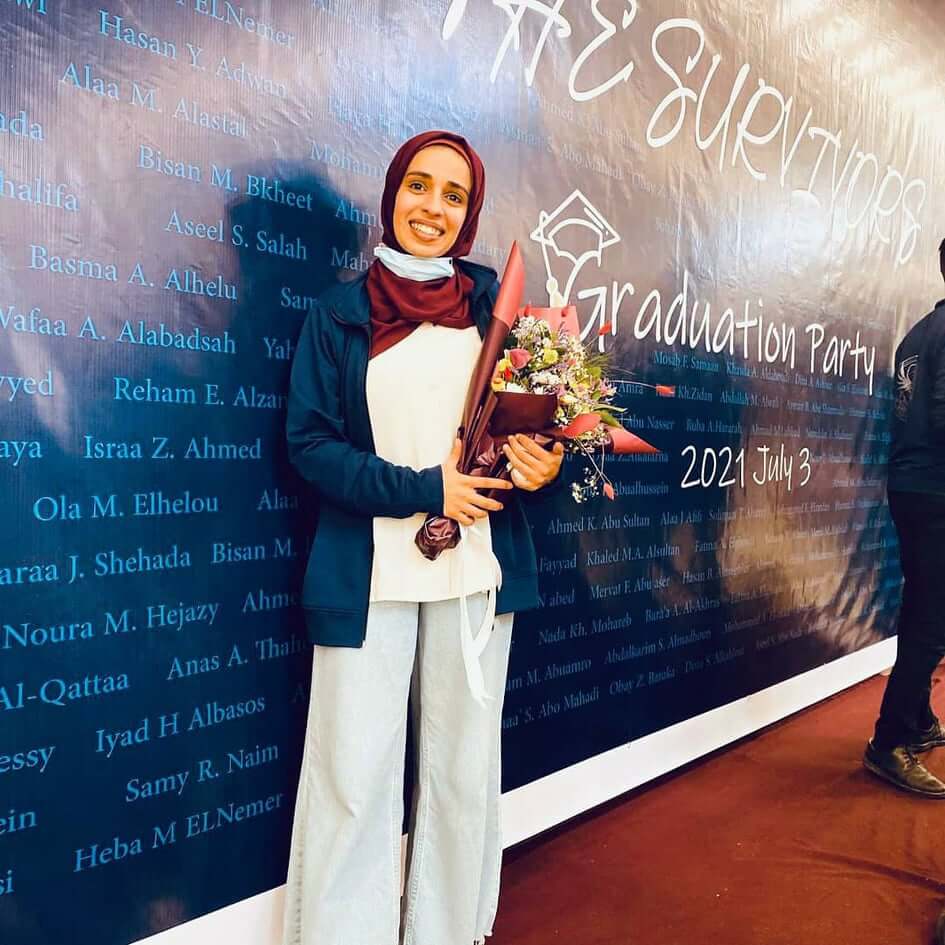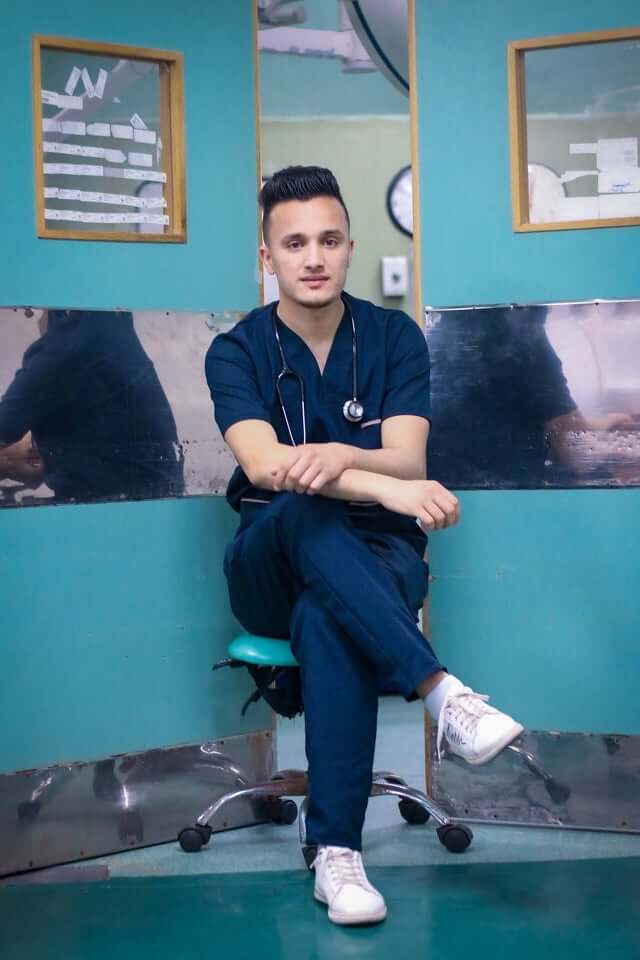Why are you enrolling your daughter in a major that requires so much money?! If she was my daughter, I’d never let her enter medical school.
This was typical of the comments received by Aseel Abu Nada’s mother after her daughter decided to pursue a medical degree. And she understands why.
“My family went through a lot to pay my tuition fees over the course of six years, and yet it wasn’t enough,” Aseel explains. “I still owe the university $2,470 and I have to pay it before I can get the degree I worked so hard to achieve.”

Assel is one of 73 medical students (from a class of 123) who have worked since 2015 to become physicians but will not be able to graduate until they can pay their remaining tuition fees. To help them, the Medical Students Union at the Islamic University of Gaza has launched a crowdfunding campaign with a goal of raising $30,000 in the first phase.
“Seventy-three isn’t just a number,” says the union on its campaign page. “Each student has a story of suffering with their families who stand helplessly by, unable to cover their children’s educational needs because of their difficult economic circumstances.”
Aseel lives with a family of eight, including two brothers also studying medicine. Despite the burden, her mother has consistently supported the pursuit of their dreams. As the eldest child, Aseel feels a particular responsibility—not only for her family’s financial struggles, but also to use her skills (as soon as she can practice) to help find a treatment for her mother’s keratoconus, an eye condition that makes it difficult to focus while she works long hours as a nurse at a government clinic. (Once Aseel pays for her undergraduate degree, she must go on to complete a year of internship and five years of specialized study in ophthalmology.)
“I still remember my first day, when I went to the Student Affairs Department to ask about the scholarships offered by the university,” recalls Aseel. “But the university had no money left for that. Only a year had passed since the Israel’s most massive war on Gaza.”
Today, Gaza has just weathered yet another Israeli war, and the health sector is reeling. Palestinian Minister of Health Mai Al-Kila reports that 89 treatment centers and ambulances were hit and many nurses and doctors were injured (two physicians were killed). Aseel and her classmates are sorely needed.
I interviewed Omar Riad al-Najjar, a fourth-level student at the IUG’s College of Medicine, who is coordinating the initiative to help cover the fees of Aseel and her classmates.
How much does it cost to study medicine at IUG?
Earning a general medical degree requires six academic years divided into 17 semesters: That’s a total of 247 academic hours. The fee for one hour of instruction is 70 Jordanian dinars, or 99 U.S. dollars—which translates into $4,000 annually and $24,453 for the entire six years of study. Then, of course, there are other costs for textbooks, medical equipment, transportation to and from home, etc.
What is driving the critical lack of resources among Gaza’s medical students?
According to the Central Bureau of Statistics, Gaza’s unemployment rate is 49% right now. So many parents don’t have any income. Even those who work earn very little. The UN reports that the average salary in Gaza is about $2,000 annually, which is just half of the tuition! The Ministry of Social Affairs reports that the poverty rate has reached 75%, with 34% below the extreme poverty line. That’s the highest in the world.
How great is the need among Aseel’s class?
According to IUG’s dean of student affairs, the 73 graduating students who cannot pay their full tuition owe an average of $3,500 each. To pay all of what they owe, we’d need $258,000. They can’t enroll in the Palestinian health system and begin practice as long as they owe any of their costs. They were supposed to have graduated July 5.
How will students be prioritized for assistance?
We agreed with the dean of student affairs that the students would be prioritized according to how much they owe and the economic hardship faced by their family, which was determined by a field survey conducted by the university.
Profiles of need
Iyad Haider al-Basous
Iyad is one among a family of seven; a sister will graduate from medical school as well, if they can raise the money. He began studying medicine in 2013 in Yemen but returned to Gaza after a year and a half due to the civil war there.

Fortunately, IUG accepted Iyad and, at first, he was able to manage the fees. But as Gaza’s economy worsened, that changed.
“After my fourth year, I had to start borrowing money from relatives and friends. Even with that, I owe 4,000 (Jordanian) dinars ($5,641). That’s a huge amount for my family,” explains Iyad, whose father works for the Palestinian Authority, and thus—due to the dispute between the PA and the Gaza government—receives only 70% of his salary.
Reham Imad al-Zumt
Reham, who is about to become a new mother, has completed seven years of study.
“I began at university studying health sciences, but when I did well enough to earn second place in my class, I transferred to the College of Medicine,” explains Reham. “In my first and second years, I received a scholarship, but as the exams became more and more difficult, I no longer qualified. To get by, I paid just a fraction of my fees, but now I must pay it all, 4,000 dinars, to graduate. My husband doesn’t have a permanent job; that is a very exorbitant amount for us to pay.”
Alaa al-Akkad
Alaa comes from a family of 10. Like Iyad, his father works for the Palestinian Authority and thus is not receiving his full salary.
“After my high school grades were released in 2015, I started thinking about what I dreamed of, which is to become a doctor,” he recalls. “I hoped to go abroad, but there is a scarcity of scholarships and even if you get one, the crossings out of Gaza are often closed. My only solution was to study at the Islamic University here.”
At university, Alaa distinguished himself, becoming editor of its medical journal.
“Now, though, here I am at the gates of the final-year exams and I have been deprived of taking them because of the many accumulated fees,” he says, adding that two of his siblings dropped out of university after just a year due to an inability to pay the tuition. “All of us have pursued our dream of practicing medicine and taking care of our people for six years of fatigue and struggle, and now it may come to nothing. But we will not give up hope.”
So where are the Palestinian voices in mainstream media?
Mondoweiss covers the full picture of the struggle for justice in Palestine. Read by tens of thousands of people each month, our truth-telling journalism is an essential counterweight to the propaganda that passes for news in mainstream and legacy media.
Our news and analysis is available to everyone – which is why we need your support. Please contribute so that we can continue to raise the voices of those who advocate for the rights of Palestinians to live in dignity and peace.
Palestinians today are struggling for their lives as mainstream media turns away. Please support journalism that amplifies the urgent voices calling for freedom and justice in Palestine.
 RSS Feed
RSS Feed















 July 8th, 2021
July 8th, 2021  Awake Goy
Awake Goy  Posted in
Posted in  Tags:
Tags: 













